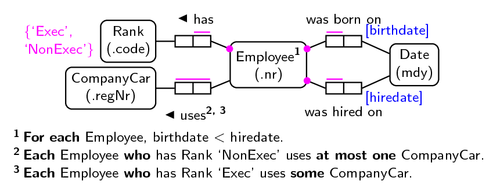This is an example for the tkz-orm package included in its documentation. It redraws a diagram found in Halpin & Morgan's "Information modeling and relational databases" p 902.

Edit and compile if you like:
% Title: Example for tkz-orm v0.1 2010/01/25
% Author: Jakob Voß
% Site: http://tug.ctan.org/tex-archive/graphics/pgf/contrib/tkz-orm/
%
% This is an example for the 'tkz-orm' package included in its
% documentation. It redraws a diagram found in Halpin & Morgan's
% "Information modeling and relational databases" p 902.
\documentclass{article}
\usepackage{tkz-orm}
\usepackage[active,tightpage]{preview}
\PreviewEnvironment{tikzpicture}
\setlength\PreviewBorder{5pt}%
\begin{document}
\begin{tikzpicture}[orm]
\entity (E) {Employee\ormind{1}\\(.nr)};
\binary[left=of E.north west, unique=2, label=\ormleft{has}] (h) {};
\binary[left=of E.south west, unique=1-2,
label=below:\ormleft{uses\ormind{2, 3}}] (u) {};
\entity[left=of h] (Rank) {Rank\\(.code)};
\entity[left=of u] (Car) {CompanyCar\\(.regNr)};
\node[constraint=text, align=left, anchor=east] at (Rank.west)
{$\{$`Exec',\\`NonExec'$\}$};
\plays[mandatory] (E) to (h.east);
\plays (h) to (Rank) (E) to (u.east) (u) to (Car);
\binary[right=of E.north east, unique, label=was born on] (b) {};
\binary[right=of E.south east, unique, label=below:was hired on] (i) {};
\entity[right=1.8 of E] (Date) {Date\\(mdy)};
\plays[mandatory] (E) to (b.west) (E) to (i.west);
\plays (b.east) to (Date) (i.east) to (Date);
\node[role name, anchor=south west] at (b.east) {[birthdate]};
\node[role name, anchor=north west] at (i.east) {[hiredate]};
\rules at (-.4, -2) {
\node[rule=1] {{\ormbf For each} Employee, birthdate $<$ hiredate.};\\
\node[rule=2] {
{\ormbf Each} Employee {\ormbf who} has Rank `NonExec' uses
{\ormbf at most one} CompanyCar.};\\
\node[rule=3] {
{\ormbf Each} Employee {\ormbf who} has Rank `Exec' uses
{\ormbf some} CompanyCar.};\\
};
\end{tikzpicture}
\end{document}
Click to download: tkz-orm-example.tex • tkz-orm-example.pdf
Open in Overleaf: tkz-orm-example.tex